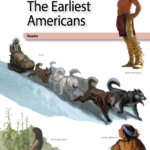In this simulation, elementary or middle school students convene as an Iroquois council in upstate New York, 1777. British agents are trying to convince Iroquois nations to take their side in the Revolutionary War.
The Earliest Americans (CKHG Unit)

Across 17 lessons, this unit introduces some of the different peoples who populated America many years before the arrival of European explorers—some as early as thirty thousand years ago along the Pacific Coast, and others who traveled from Asia across Beringia, the land bridge. Students explore how these early peoples spread across North and South America, adapted to their environments and developed unique cultures. Each lesson is designed to last 30 minutes.
“Corner Stone” Speech
This speech was delivered in Savannah after Georgia and six other states had seceded from the Union but before hostilities had begun with the Confederate assault on Fort Sumter. Stephens lauded the Confederate states for rejecting the radical theories of Thomas Jefferson and the American founders and establishing instead, for the first time in history, a government resting upon the self-evident truth of racial inequality.